Emir Hadzikadunic || 29 March 2022
Muslim leaders and Islamic related constraints on foreign policymaking
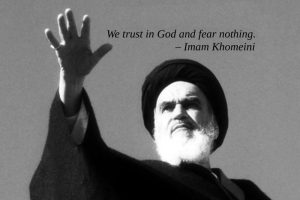 Foreign policy is ultimately formulated and implemented by individuals in leadership positions, “suggesting that obvious and important avenues of research in the role of religion in foreign policy are the beliefs of leaders.”[1]The behavioralist school also equated the state with the concrete decision-maker(s) whose behavior can easily be observed in a systematic way.[2] Therefore, questions of who draws what Islamic ideas among prominent Muslim leaders to pursue what foreign policies must be essential.
Foreign policy is ultimately formulated and implemented by individuals in leadership positions, “suggesting that obvious and important avenues of research in the role of religion in foreign policy are the beliefs of leaders.”[1]The behavioralist school also equated the state with the concrete decision-maker(s) whose behavior can easily be observed in a systematic way.[2] Therefore, questions of who draws what Islamic ideas among prominent Muslim leaders to pursue what foreign policies must be essential.
It is generally accepted that the influence of the political elite is hierarchical. The higher the rank of the individual in the state, the greater influence he or she exerts. Though he was not effective and long serving, Turkey’s first Islamist prime minister Necmettin Erbakan “openly called for the creation of an Islamic version of the North Atlantic Treaty Organization, an Islamic United Nations, an Islamic common market, and a group of eight developing Islamic nations (D-8) to counter the industrialized Group of Seven (G-7).” He also “turned down invitations to Europe and opted instead to visit Muslim countries throughout Asia and Africa, including decidedly anti-Western nations like Iran and Libya.”[3] In some cases, if an individual can make a difference in the foreign policy of a given state it will stem from how he or she sees the world.[4] The way Ayatollah Ruhollah Khomeini saw the world around him at the peak of his political authority strongly, if not exclusively, shaped the Islamic republic’s foreign policy. According to James H. Kruse, Khomeini’s world was divided into oppressors and the oppressed. “The US and the Soviet Union were clearly the leading oppressors and divided the world between their capitalist and socialist views.”[5] His world was also divided into “those who follow the ‘right path’, the ‘path of God and belief’ and those who follow the ‘corrupt path’ the path of Satan and disbelief”.[6] This led to Khomeini’s support for an isolationist foreign policy of “neither east, nor west.”[7]
M. Hermann has identified other circumstances in which leadership assessment is more important. According to her, it is more suitable when the head of state is charismatic.[8] General Muhammad Zia-ul-Haq, the ruler of Pakistan (1977-1988), was a charismatic political figure responsible for turning his country into a global center for political Islam.[9] His motivation possibly included Zia’s piety that came from his religious family.[10] It was also reinforced by strong incentives from local Islamic organizations. During his reign, religion and politics were most closely connected in Pakistan’s history.[11] In his case, individual and domestic constraints largely interplayed. Notwithstanding his intention to Islamize Pakistan domestically and enforce often argued and disputed Nizam-e-Islam, no less significant was Zia-ul-Haq’s interest in promoting the unity of Muslim Ummah. Thus, he drew on Pakistan’s Islamic, trade, and military ties to the Middle East, including stationing Pakistani troops in Saudi Arabia and training missions in several other countries. He played a prominent role in the OIC by serving on committees concerning the status of Jerusalem and the Iran-Iraq war. He also played a key role in the readmission of Egypt to the OIC at the 1984 summit at Casablanca.[12]
On the opposite side was Indonesian leader Suharto (1965-1998). Even though he ruled over the state with the largest number of citizens professing the Islamic faith in the world, his authoritarian regime repressed political Islam at home and banned it from Indonesian foreign policy.[13] With a strong human agency that interplayed with a strong and secular military, Islamic attributes could not constrain Indonesian relations with other Muslim or non-Muslim states in any meaningful way. Only with his resignation in May 1998, Islam has become noticeable in the policymaking process. Some changes were already visible under President Susilo Bambang Yudhoyono (2004-2014) whose operational and psychological environments were seemingly different from Suharto’s. In a speech in Saudi Arabia, Yudhoyono reviewed many problems facing the Muslim community, including “Islamophobia,” and argued that Muslims should respond by embracing “technology and modernity and a culture of excellence.” Noting that Islam was not only a religion of peace, but also one of progress, Yudhoyono also called for an Islamic renaissance and urged his Muslim brethren to embrace globalization, reach out to non-Muslims, and cooperate against terrorism.[14] His motivations to involve Islamic reference in Indonesia’s foreign policy also interplayed with more important emergence of Islam as a political force in Indonesia’s domestic politics. In the same light, individual inputs of Yudhoyono’s successor Joko Widodo, who called for a “middle way” form of Islam (wasatiyyah Islam)[15] in Indonesia’s foreign policy, were expectedly reinforced by much stronger domestic factors that we discuss in the next part.
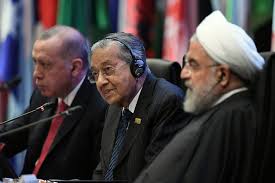 If ever there was a Muslim leader whose foreign policy performance also called for qualitative interpretation, surely it is the Mahathir Mohamad’s Administration in Malaysia. He promoted an Islamic image of the country internationally but he did that “over and beyond any of its predecessors.”[16] The significance of Islam in his foreign policy has to be understood in terms of Mahathir’s understanding of the significant role that Islam plays in the mindset and values of the Malays.[17] To Mahathir, according to Ahmad Faisal Muhamad, “the problems of Muslim Malays are not unique to them, but typical of the Muslim ummah as a whole.”[18] In this regard, individual and domestic constraints in this particular case interacted and reinforced each other. In terms of foreign policy commitments, the Malaysian Prime Minister was outspoken on issues where Muslim people were victimized by non-Muslim states. His sentiments can be summarized by the following words: ‘We are all Muslims. We are all oppressed. We are all being humiliated.’[19] He also raised pitiful state of Muslim affairs and concerns of contemporary conditions of Muslim ummah and Islam. Mahathir’s opening remarks at KL Summit from December 2019 illustrate his deep-seated concerns:
If ever there was a Muslim leader whose foreign policy performance also called for qualitative interpretation, surely it is the Mahathir Mohamad’s Administration in Malaysia. He promoted an Islamic image of the country internationally but he did that “over and beyond any of its predecessors.”[16] The significance of Islam in his foreign policy has to be understood in terms of Mahathir’s understanding of the significant role that Islam plays in the mindset and values of the Malays.[17] To Mahathir, according to Ahmad Faisal Muhamad, “the problems of Muslim Malays are not unique to them, but typical of the Muslim ummah as a whole.”[18] In this regard, individual and domestic constraints in this particular case interacted and reinforced each other. In terms of foreign policy commitments, the Malaysian Prime Minister was outspoken on issues where Muslim people were victimized by non-Muslim states. His sentiments can be summarized by the following words: ‘We are all Muslims. We are all oppressed. We are all being humiliated.’[19] He also raised pitiful state of Muslim affairs and concerns of contemporary conditions of Muslim ummah and Islam. Mahathir’s opening remarks at KL Summit from December 2019 illustrate his deep-seated concerns:
‘The Muslims are running away from their own countries to seek refuge in non-Muslim countries. We cannot deny that we are largely dependent on the non-Muslims for most of our needs. In fact, although the Quran enjoys upon us to be prepared to protect the ummah, we are unable to do so because for a long time we cannot even equip ourselves with means to ward off attacks by others… If the future remains as we are now, we will suffer continues oppression, we will decline further, and our great religion will be denigrated as a religion of a failure…’[20]
In terms of specific foreign policy actions, Mahathir repeatedly raised in multilateral and bilateral forums the challenges of his time, in particular the issues of Palestine and Bosnia and Herzegovina. For example, Mahathir announced that his administration would accord the Palestinian Liberation Organization (PLO) diplomatic status in 1981, making Malaysia the only country in Southeast Asia and the second in the world, after Pakistan, to do so at the time.[21] He also emerged as an outspoken champion for the Bosnian cause. Driven by his principles, he severed relations with Belgrade and used every good opportunity to vocally criticize the West for tolerating rampant injustices of the Bosnians. Similar expressions of solidarity were taken by other Muslim leaders. Tansu Çiller caused a stir when, without Israel’s approval, she visited the Palestinian headquarters in eastern Jerusalem known as the Orient House and met with a Palestinian delegation in 1994.[22] In the same year, Çiller and Benazir Bhutto, then prime minister of Pakistan, also visited Sarajevo under siege and demonstrated their political support for besieged Bosnian government.
Some may look for more empirical approaches in assessing the relationship between individual decision-makers from Muslim majority states and their foreign policy outcomes. In such cases, it is not an easy task to define a conception of what it means to be a Muslim foreign policy leader guided by his or her Islamic faith. For that reason, analysts may look for other individual attributes that can reveal some sensitivities with Islam or expose their absence from foreign policymaking. Leadership and cognitive theories come close to this conceptualization of mutually interwoven elements of culture, worldview, and religion. Hermann, for example, brings psychological traits to yield fruitful insights into the nature of leadership. As a result of her framework, one can systematically learn whether decision-makers from Muslim-majority states score low or high on nationalism. This particular score indirectly discloses whether the same decision-makers perceive their “ingroup” more or less as fellow Muslims. Hermann also demonstrates that combinations of related traits define a specific leadership style.[23] In this regard, one possibly explores which Muslim leader has an evangelistic profile that is characterized more for “persuading others to join one’s mission and mobilizing others around one’s message”.[24] These characteristics that interrelate themselves with religious constraints may predispose a person to a certain type of foreign policy action.
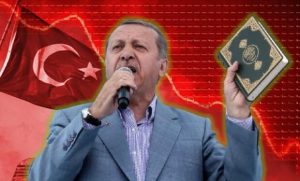 Different authors have already measured the influence of these traits on foreign policymaking in Muslim-majority states. Aylin S. Gorener and Meltem S. Ucal investigated Recep Tayyip Erdogan’s worldview to evaluate its impact on his foreign policies in 2009.[25] In comparison with the reference group consisted of 214 political leaders from around the world, Erdogan’s low scores on nationalism indicate that he defines his “ingroup” more as fellow Muslims. For Gorener and Ucal “Erdogan perceives Islamic identity as one that subsumes all other differences among people and nations”. Hakan Yavuz similarly claims that “Erdogan has no special sense of nationalism or of being a Turk… From Erdogan’s perspective, a nation is a religious community and the people of Turkey constitute a nation by sharing Islam.”[26] Among different foreign policy moves that reflected his style is Ankara’s interest in the Organization of Islamic Cooperation and its intention to utilize religious diplomacy at institutional level.[27] With the election of Ekmeleddin Ihsanoglu as the OIC secretary-general in 2004, Turkey upgraded its role within the OIC structure to the highest level.[28] In addition to Erdogan’s low score on nationalism, his high level of distrust of others “leads him to approach politics as a battle between good and evil and as a struggle to defend his kind.”[29] His aggressive policy toward Israel is “an exemplar of his attitude toward those whom he does not perceive as reliable dialogue partners”. In this regard, “there is no denying that his religious sentiments play a significant part in who deems as friends or foes”.[30] Gorener and Ucal have finally concluded that Erdogan exhibits behavior consistent with evangelical leadership style. Such leaders are the least sensitive to the political context. Their most important goal is to attract as many people as possible to their cause.
Different authors have already measured the influence of these traits on foreign policymaking in Muslim-majority states. Aylin S. Gorener and Meltem S. Ucal investigated Recep Tayyip Erdogan’s worldview to evaluate its impact on his foreign policies in 2009.[25] In comparison with the reference group consisted of 214 political leaders from around the world, Erdogan’s low scores on nationalism indicate that he defines his “ingroup” more as fellow Muslims. For Gorener and Ucal “Erdogan perceives Islamic identity as one that subsumes all other differences among people and nations”. Hakan Yavuz similarly claims that “Erdogan has no special sense of nationalism or of being a Turk… From Erdogan’s perspective, a nation is a religious community and the people of Turkey constitute a nation by sharing Islam.”[26] Among different foreign policy moves that reflected his style is Ankara’s interest in the Organization of Islamic Cooperation and its intention to utilize religious diplomacy at institutional level.[27] With the election of Ekmeleddin Ihsanoglu as the OIC secretary-general in 2004, Turkey upgraded its role within the OIC structure to the highest level.[28] In addition to Erdogan’s low score on nationalism, his high level of distrust of others “leads him to approach politics as a battle between good and evil and as a struggle to defend his kind.”[29] His aggressive policy toward Israel is “an exemplar of his attitude toward those whom he does not perceive as reliable dialogue partners”. In this regard, “there is no denying that his religious sentiments play a significant part in who deems as friends or foes”.[30] Gorener and Ucal have finally concluded that Erdogan exhibits behavior consistent with evangelical leadership style. Such leaders are the least sensitive to the political context. Their most important goal is to attract as many people as possible to their cause.
Former Iranian president Mahmoud Ahmadinejad also scores low on nationalism in comparison to the reference group and shares some features of evangelistic leadership style as well.[31] On different occasions, he used religiously inspired terminology and presented himself as a spiritual leader and messianic missionary. An example of it is a rather vague 18-page letter that he sent to President Bush in Farsi on May 9, 2006. In this letter, Ahmadinejad quoted holy verses, discussed religious values and history. The following part is very illustrative:
“We increasingly see that people around the world are flocking towards a main focal point – that is the Almighty God. Undoubtedly through faith in God and the teachings of the prophets, the people will conquer their problems. My question for you is: Do you not want to join them?”
Interestingly, Ahmadinejad does so by avoiding words like ‘Islam’ or ‘Muslim’. “He actually does not take the position of a Muslim speaking on behalf of an Islamic republic, but as a member of the international community who argues for the introduction of ethical values – preferably monotheistic values – into international relations.”[32] Part of his much longer statement at the UN from September 19, 2006, is a good illustration: ‘The Almighty and Merciful God, who is the Creator of the Universe, is also its Lord and Ruler. Justice is His command. He commands His creatures to support one another in good, virtue, and piety, and not in decadence and corruption. He commands His creatures to enjoin one another to righteousness and virtue and not to sin and transgression.’[33]
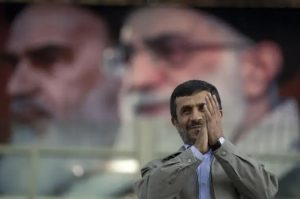 Given common leadership styles between Erdogan and Ahmadinejad, this article finds it possibly instrumental for cordial and brotherly relations between Turkey and Iran in the late 2000s and early 2010s. For example, in referring to the Iranian President Mahmoud Ahmadinejad, Erdogan says, “there is no doubt he is our friend…as a friend so far we have very good relations and have had no difficulty at all.”[34] From the other side, the Iranian government led by Ahmadinejad had trusted Turkey more than other nations and therefore selected Istanbul as the venue for important nuclear talks with five permanent UN Security Council members, the US, Russia, China, Britain, and France, plus Germany in January 2011. Iran, Turkey, and Brazil also signed the Tehran declaration in May 2010 whereby Iran agreed “to deposit 1200 kg LEU (Lightly Enriched Uranium) in Turkey”.[35] This event was joyfully marked at the end of the signing ceremony when then Prime Minister Erdogan crossed the table, joined group of journalists and made photos of smiling then presidents Ahmadinejad and Lula. On other issues, Erdogan and Ahmadinejad also made complementary complains about the functioning of the present international order and the UN system which is based on an unequal distribution of power. As Erdogan famously stated in his speech on 74th UN General Assembly, “the world is bigger than five”, his doctrine enters down to textbooks. Ahmadinejad also called throughout his presidency for Veto power in the UN Security Council to be scrapped.
Given common leadership styles between Erdogan and Ahmadinejad, this article finds it possibly instrumental for cordial and brotherly relations between Turkey and Iran in the late 2000s and early 2010s. For example, in referring to the Iranian President Mahmoud Ahmadinejad, Erdogan says, “there is no doubt he is our friend…as a friend so far we have very good relations and have had no difficulty at all.”[34] From the other side, the Iranian government led by Ahmadinejad had trusted Turkey more than other nations and therefore selected Istanbul as the venue for important nuclear talks with five permanent UN Security Council members, the US, Russia, China, Britain, and France, plus Germany in January 2011. Iran, Turkey, and Brazil also signed the Tehran declaration in May 2010 whereby Iran agreed “to deposit 1200 kg LEU (Lightly Enriched Uranium) in Turkey”.[35] This event was joyfully marked at the end of the signing ceremony when then Prime Minister Erdogan crossed the table, joined group of journalists and made photos of smiling then presidents Ahmadinejad and Lula. On other issues, Erdogan and Ahmadinejad also made complementary complains about the functioning of the present international order and the UN system which is based on an unequal distribution of power. As Erdogan famously stated in his speech on 74th UN General Assembly, “the world is bigger than five”, his doctrine enters down to textbooks. Ahmadinejad also called throughout his presidency for Veto power in the UN Security Council to be scrapped.
This chapter may be concluded with leadership traits of then Iraqi president Saddam Hussein. His profile was derived from an assessment of 21,000 words from compiled interviews he had given since 1979. Given his high scores on nationalism and distrust of others, he was likely to take his actions on his own and different from other leaders with lower scores on nationalism. Furthermore, he likely perceived the world as highly anarchic and full of threats. As Hermann explained, all scores of Saddam Hussein suggested that he had an expansionistic orientation to politics.[36] However, his high scores on nationalism and distrust of others also resemble his eccentric interpretation of Islam that Ba‘thist intellectuals had developed in the mid-twentieth century. For Saddam Hussein and many other Ba‘thists, Islam was the religion of the Arabs.[37] As Samuel Helfont maintained, Saddam Hussein considered non-Arab Muslims to be lesser Muslims and expected them to recognize the special role of the Arab people.[38]
Though Islamic constraints on foreign policymaking are not limited to selected Muslim leaders from this analysis, they are sufficient to present diversity of their foreign policy views, commitments and actions. Selected leaders are also sufficient to demonstrate that strong and charismatic leadership may act as an intervening variable in a limited number of foreign policy issues – promoting relations within Muslim world, boosting Islamic solidary, voicing out violations of human (Muslim) rights, calling for a “middle way” (wasatiyyah Islam), addressing pitiful state of Muslim affairs, in short putting related Islamic issues on their foreign policy agenda.
Endnotes:
[1] Warner and Walker, “Thinking about the Role of Religion in Foreign Policy…,” 126.
[2] Tayfur, “Main Approaches to the Study of Foreign Policy: A Review,” 120
[3] Gregory A. Burris, “Turkey-Israel: Speed Bumps,” Middle East Quarterly, Fall 2003, Volume 10, pp. 67-80, accessed March 4, 2021 https://www.meforum.org/569/turkey-israel-speed-bumps
[4] Tayfur, “Main Approaches to the Study of Foreign Policy: A Review,” 131.
[5] James H. Kruse, “Determinants of Iranian Foreign Policy: The Impact of Systemic, Domestic and Ideological Factors,” (Unpublished Master thesis, Naval Postgraduate School, California, 1994), 53, accessed 10, 2021, https://calhoun.nps.edu/bitstream/handle/10945/28116/determinantsofir00krus.pdf?sequence=1&isAllowed=y
[6] Shireen T. Hunter, Iran and the World, Continuity in a Revolutionary Decade, Bloomington and Indianapolis: Indiana University Press, 1990, p. 37.
[7] Kruse, “Determinants of Iranian Foreign Policy: The Impact of Systemic, Domestic…,” 53.
[8] M. Hermann, “Circumstances under Which Leader Personality Will Affect Foreign Policy: Some Propositions,“ in J. Rosenau (ed.), In Search of Global Patterns, 326-32. New York: Free Press, 1976.
[9] Husain Haqqani, Pakistan: between mosque and military, Washington: Carnegie Endowment for International Peace, 2005, p. 131.
[10] Ibid., 132.
[11] Yungui, “The Influence of Islam over the Foreign Policies of Contemporary Islamic Countries,” 2-3
[12] Sabiha Hasan, “The Casablanca Islamic Summit,” Pakistan Horizon 37, no. 1 (1984): 74-87, accessed February 14, 2021: http://www.jstor.org/stable/41403909. See also: Defense Journal, Special Report, April 1998, accessed January 10, 2021: http://www.defencejournal.com/april98/ziaregime.htm.
[13] Ann Marie Murphy, “Islam in Indonesian Foreign Policy: The Limits of Muslim Solidarity for the Rohingya and Uighurs,” The Asan Institute for Policy Studies, Dec 08, 2020, p. 1., accessed December 25, 2020: http://en.asaninst.org/contents/islam-in-indonesian-foreign-policy-the-limits-of-muslim-solidarity-for-the-rohingya-and-uighurs/#2
[14] President Susilo Bambang Yudhoyono, Speech at Islamic University of Iman Muhammad Bin Sa’ud, Riyadh, Saudia Arabia. See: Murphy, “Islam in Indonesian Foreign Policy: The Limits of Muslim Solidarity for the Rohingya and Uighurs,” 2.
[15] Evan Laksmana, “Will religious sectarianism change Indonesian foreign policy?,” The Strategist, December 11, 2018, accessed February 25, 2021, https://www.aspistrategist.org.au/will-religious-sectarianism-change-indonesian-foreign-policy/. See also: KH Ma’ruf Amin, “Emergence of Wasatiyyah Islam: Promoting ‘Middle Way’ Islam and Socio-Economic Equality in Indonesia,” An excerpt of his Distinguished Lecture at RSIS in Singapore on 17 Oct 2018, S. Rajaratnam School of International Studies (RSIS), Nanyang Technological University (NTU), Singapore, accessed February 25, 2021, https://www.rsis.edu.sg/rsis-publication/rsis/emergence-of-wasatiyyah-islam-promoting-middle-way-islam-and-socio-economic-equality-in-indonesia/#.XAbIsy2ZM1g
[16] Shanti Nair, Islam in Malaysian Foreign Policy, London and New York: Routledge, 1997, p. 269.
[17]Ahmad Faisal Muhamad, “The Struggle for Recognition in Foreign Policy: Malaysia under Mahathir 1981-2003,” A thesis submitted for the degree of Doctor of Philosophy in International Relations, 2008, p. 245
[18] Ibid.
[19] Prime Minister Mahathir bin Mohamad at the opening of the tenth session of the summit of the Organization of Islamic Conference, 16 October 2003; See also: Berger, Religion and Islam in Contemporary…, 20.
[20] Prime Minister Mahathir bin Mohamad at the opening of the KL Summit, December 19, 2019, accessed March 10, 2021: https://www.youtube.com/watch?v=w2CagBqqZns
[21] Nair, Islam in Malaysian Foreign Policy, 269.
[22] Burris, “Turkey-Israel: Speed Bumps,” 67-80.
[23] Margaret G. Hermann, “Assessing Leadership Style: A Trait Analysis,” in The Psychological Assessment of Political Leaders – With profiles of Saddam Hussein and Bill Clinton, ed. Jerold M. Post, (Ann Arbor: University of Michigan Press, 2003), 185.
[24] Hermann, “Assessing Leadership Style: A Trait Analysis,” 195.
[25] The profile of Erdogan is derived from 53,629 words collected from interviews and press conferences from January 1, 2004, to December 31, 2009. See: S. Gorener and Meltem S. Ucal, “The Personality and Leadership Style of Recep Tayyip Erdogan: Implication for Turkish Foreign Policy,” Turkish Studies, Vol. 12, No. 3 (2011): 366, accessed Dec. 10, 2014 DOI: 10.1080/14683849.2011.604216.
[26] M. Hakan Yavuz, Secularism and Muslim Democracy in Turkey, Cambridge: Cambridge University Press, 2009, 120; Deborah Sontag, “The Erdogan Experiment,” New York Times, May 11, 2003. Yavuz (2009), 131.
[27] Ozkan and Chatterjee, “Islamic Values in Foreign Policy…,” 119.
[28] Mehmet Ozkan, “Turkey in the Islamic World: An Institutional Perspective,” Turkish Review of Middle East Studies 18 (2007): 159–93.
[29] Gorener and Ucal, “The Personality and Leadership Style of Recep Tayyip Erdogan: Implication for…,” 375.
[30] Gorener and Ucal, “The Personality and Leadership Style of Recep Tayyip Erdogan: Implication for…,” 373.
[31] Selected data that the author of this analysis conducted included 36.107 words. All selected transcripts focused primarily on foreign policy issues. They involved 4 of his speeches at UN forums and 6 of his interviews for international media throughout his presidency. Data analysis was conducted with Profiler Plus.
[32] Berger, Religion and Islam in Contemporary International Relations, 21.
[33] Statement of Iranian President Mahmoud Ahmadinejad before the Session of the UN General Assembly, September 19, 2006, accessed March 11, 2014:
http://www.npr.org/templates/story/story.php?storyId=6107339, also accessed on official web site of Iranian Embassy at United Nations on March 10, 2014, http://iran-un.org/en/2006/09/19/19-september-2006/.
[34] “Iran is Our Friend’ says Turkish PM Recep Tayyip Erdogan,” Guardian, October 26, 2009.
[35] Julian Berger, The Guardian, accessed December 10, 2020: https://www.theguardian.com/world/julian-borger-global-security-blog/2010/may/17/iran-brazil-turkey-nuclear
[36] Saddam Hussein’s profile was derived from an assessment of 21,000 words compiled interviews he had given since 1979. His trait results were compared with leaders from the Middle East representing the first reference group and a group of 87 heads of state representing the second norming group. Hermann, “Assessing Leadership Style: A Trait Analysis,” 185.
[37] Samuel Helfont, “The Legacy Of Saddam’s Islam,” The Caravan, Hoover Institutions: December 4, 2018, accessed January 13: https://www.hoover.org/research/legacy-saddams-islam
[38] Ibid.
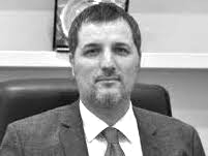 Dr Emir Hadzikadunic is a Senior Research Fellow at the Islamic Renaissance Front. He holds a PhD in International Relations from the International University of Sarajevo and was the Ambassador of Bosnia and Herzegovina to the Islamic Republic of Iran (2010-2013) and Malaysia (2016-2020). He is currently a Distinguished Fellow at Faculty of Administrative Science & Policy Studies, Universiti Teknologi MARA (UiTM) Malaysia. This essay also appears on Context: Journal of Interdisciplinary Studies at https://cns.ba/contextojs/index.php/context
Dr Emir Hadzikadunic is a Senior Research Fellow at the Islamic Renaissance Front. He holds a PhD in International Relations from the International University of Sarajevo and was the Ambassador of Bosnia and Herzegovina to the Islamic Republic of Iran (2010-2013) and Malaysia (2016-2020). He is currently a Distinguished Fellow at Faculty of Administrative Science & Policy Studies, Universiti Teknologi MARA (UiTM) Malaysia. This essay also appears on Context: Journal of Interdisciplinary Studies at https://cns.ba/contextojs/index.php/context

